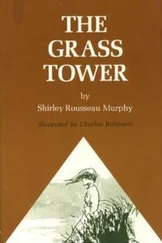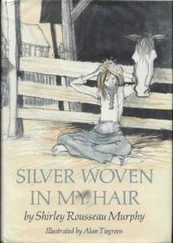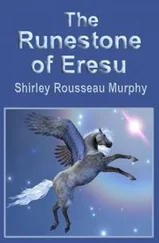Some time later she whispered, as if she could not put it aside, “He sees an evil. There is an evil come here with you.”
In the days that followed, the child Skeelie became as necessary to Tayba as Dlos was. The wiry little girl moved quickly and silently to care for Ram, who still had uttered no word since he woke, and to care for Tayba, bringing food, bringing hot water in jugs to fill a bathing tub, then lugging out the dirty water, finding clean cloth for Tayba’s bandages and laving on the salve Dlos provided. Tayba’s wound was painful and slow healing. And Ram remained in that somnolent state between sleeping and waking that tore at Tayba. Sometimes she did not know whether he would live or die. She wanted to pull life from the world around her and force it into him. Only Skeelie seemed to understand the thing that possessed him. The child was sure and strong with him, seemed to know his needs despite the boy’s silence. Tayba woke one morning to see her standing by the window with Ram seated on the sill and heard Ram speak for the first time. His voice was small and still, cold as winter.
“There is something here with us. Something—can’t you feel it, Skeelie?”
“What kind of something?”
“Something dark that wants to speak inside me, to be inside me. I don’t want it there! I don’t want it!”
Tayba rose and came to stand beside them, to stare mutely at Ram. She wanted to hold him, but Ram did not reach for her. He clung to Skeelie. She turned away at last, feeling useless and afraid.
Gredillon had taught her nothing to deal with such as this. Was it only the blow on the head that made Ram like this? Or had the power of the bell turned on him? Had the wolves loosed some evil against him because he had called them? Some revenge that Ram did not understand and had no power against?
She had looked for the wolf bell among their washed and mended clothes. Their swords were there, the scabbards, a small knife Ram had always carried. The bell was not. The old woman had not found it.
Well, she was glad, she didn’t want it found. Unless—had EnDwyl taken the wolf bell while Ram lay unconscious? She could not remember, shook her head in confusion; could remember the blood and the great shaggy wolves all around her, but could not bring the rest of the scene clear in her mind.
And even if EnDwyl had the bell, he could command nothing of it. Or so Gredillon had believed.
She turned back to the window to stare uncertainly out at the mountains. Somewhere up among those peaks did the wolves wait, against their wills, for Ram to call them? They had terrified her. They had looked at Ram as if. . . . She shuddered. They might have saved Ram once, but surely they rebelled at being controlled by a human power. Wouldn’t they yearn to destroy that power, to free themselves from it? Surely the jackals of Scar Mountain had rebelled as Ram held them. She stared hard at the mountain. The bell is gone! She thought angrily. Ram can’t use it against you! Leave him alone! If you have laid a curse on him, leave him alone! He can ’t touch you now!
The rising sun caught the edges of the low eastern hills, then the mountain. She knelt, pressing her forehead against the windowsill. Maybe the gods would hear her prayer, even if the wolves didn’t.
Then she rose and turned away from Skeelie, feeling embarrassed. But Skeelie put her hand out and drew her back to the window. “The slaves are coming,” she said softly. “The women will stop here to work the gardens.”
The line of slaves was marching single file, flanked by guards. The five young women were all handsome in spite of the rags they wore. They went bare-legged in the bitter cold. A guard separated them from the men, handed out hoes, and they began to weed the gardens that lay in a row behind the Hall. The men were marched away. Skeelie hung out the window, watching. “The tall one, the one with the knotted hair,” she said, “he is my brother Jerthon.” Tayba saw the tall young man clearly for a moment before the line turned the corner at the upper end of the Hall. His long red hair was knotted at his neck, his profile like Skeelie’s, clean and perfect. He walked too proudly, as if he did the guards a favor to obey them. There was a look of cold defiance about him, of anger—and of fine-drawn patience tautly held.
So Venniver kept Seers as slaves. There had been several red-headed men in the line, and one of the girls had red hair. A woman Seer, Tayba thought amazed. And how many more were Seers, without the red hair to give it away? And how, she wondered, did her brother Theel feel about keeping slaves? Well, she supposed it was all right with Theel as long as they were Seers. He had always rankled at being ruled by the Zandourian Seers, though they weren’t nearly as strong, or as cruel, as the Seers of Pelli—simply sated in the luxuries the Zandourian people provided in ritual offerings.
When would Theel acknowledge that she was in Burgdeeth? When would he come to her or summon her? Dlos had told him, she knew. Everyone in town must know there were strangers here, carried in nearly dead. Would Theel welcome them? He was a stern, unloving man; he had grown up and left home while she was still a child. And what would the leader Venniver have to say? Well, she thought, that would be up to Theel, Theel was his lieutenant; surely he would speak for her.
It took some days for Theel to acknowledge her. She grew nervous and irritable, waiting, would look up tensely when anyone entered the storeroom, convinced herself at last that he did not want her there. She had decided to find out, to seek Theel out herself—she had not been out of the storeroom into the Hall or the town yet—when at last Dlos came to say that Theel had summoned her. She stood staring at Dlos, feeling suddenly terrified. Would Theel turn them out? All at once she was very afraid that he would—and afraid of Theel himself.
She followed Dlos through the sculler then along the back corridors of the Hall, catching her first glimpse of kitchen, then dining hall, where some old women were laying the tables amidst loud clanging of cutlery. The dining hall smelled of ale. There seemed to be none but old women in this place—except for the young slave girls. They turned right into the bedroom wing. Where doors stood ajar, she could see small bare rooms. Dlos left her at Theel’s door as if she did not care to enter.
Theel’s room was sparsely furnished. Bare stone floors, bare stone walls. A narrow bed, a rough chest A sectbow hanging by the door. So chill she shivered.
Theel was even thinner than she remembered. A sour, unsmiling man, his face lined with bitterness where before it had been only cold and without laughter. He did not touch her, made no motion of warmth toward her. He sat on the chest and let her stand, waited for her to speak. When she could not find her voice, he said irritably, “Why did you come here?” He looked at her with distaste. “I heard once from a trader that my youngest sister was pregnant in sin and made worthless to our father. I suppose that is the child you brought with you, the bastard fruit of your dallying.”
“I brought my child. His name is Ramad.”
“I heard the child’s father took himself off and left you on your own. I’ll not ask how you have lived for nine years. I do not want to know. Why do you come to Burgdeeth?” he repeated.
She stared at him, her fury mounting.
“Answer me, girl! Why did you come to Burgdeeth? One does not cross that plain for the pleasure of the ride!”
“I am here because I want a new land,” she lied. “Because I was tired of the rule of Seers, of living under Seers! And I left our father before that because I was tired of being groomed like a prize ewe to increase his hoards of gold!” Theel’s eyes narrowed, studying her. She looked directly back at him. A lie mixed with truth, Gredillon had taught her, was the lie that would best be believed. “I wanted to bring my child to a place of freedom where he would not live under Seers! I want to be a part of something new, of a new land. I will be no bother to you. I will not even claim to know you if you like.”
Читать дальше
![Ширли Мерфи The Shattered Stone [calibre] обложка книги](/books/436059/shirli-merfi-the-shattered-stone-calibre-cover.webp)











